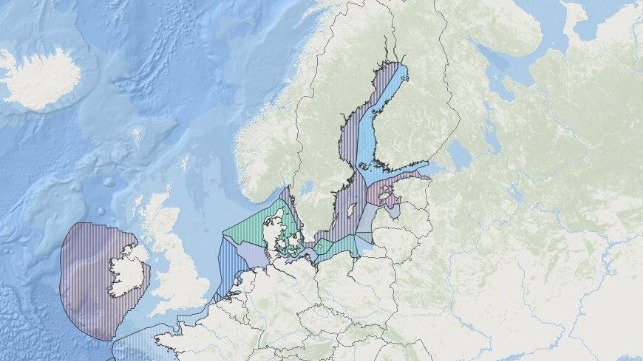Moscow Withdraws Draft That Proposed Expanding its Territorial Waters
- RFE/RL staff - May 22, 2024,
- Russia has withdrawn the draft from its Ministery of Defense that proposed expanding its territorial waters.
- The draft, dated May 21, was initially published on an official Russian portal of legal drafts.
- According to the draft, expanding the border off the coast of Kaliningrad between Baltiysk and Zelenogradsk and in the eastern part of the Gulf of Finland would have allowed the corresponding maritime areas to be used as internal sea waters of Russia.
Russia has withdrawn without explanation a Defense Ministry draft that proposed revising Moscow's maritime border in the eastern Baltic Sea and expanding its territorial waters that raised the ire of littoral NATO members Finland, Sweden, Lithuania, and Estonia.
The draft, dated May 21, was initially published on an official Russian portal of legal drafts. It proposed expanding Russia's territorial waters in the Gulf of Finland and around the Kaliningrad exclave near the maritime borders with Finland, Estonia, and Lithuania.
Since Russia launched its full-scale invasion of Ukraine in 2022, Finland and Sweden have joined NATO, leaving Kaliningrad completely surrounded by members of the alliance.
According to the draft, expanding the border off the coast of Kaliningrad between Baltiysk and Zelenogradsk and in the eastern part of the Gulf of Finland would have allowed the corresponding maritime areas to be used as internal sea waters of Russia as vessels made the trip from St. Petersburg.
It also proposed changes off the coast of Lithuania in the area of the Curonian Spit, the crescent-shaped sand dune separating the Curonian Lagoon from the Baltic Sea.
Following the publication of the draft, Lithuania's Foreign Ministry said it was "summoning a representative of the Russian Federation for a full explanation." Moscow has not had an ambassador in Vilnius since April 2022.
Lithuania expelled Moscow's envoy and downgraded its diplomatic relations with Russia following the atrocities allegedly committed by Russian forces in the Ukrainian town of Bucha.
"Another Russian hybrid operation is under way, this time attempting to spread fear, uncertainty, and doubt about their intentions in the Baltic Sea," Lithuanian Foreign Minister Gabrielius Landsbergis wrote on X, formerly Twitter.
“Finland acts as always: calmly and based on facts,” Finnish President Alexander Stubb wrote on X.
Finnish Prime Minister Petteri Orpo said Helsinki will monitor Russia's moves, while Foreign Minister Elina Valtonen told reporters that Helsinki was "following the situation."
"We don't have any official information on what Russia is planning," she said.
Swedish Prime Minister Ulf Kristersson reminded Moscow that it was a signatory to the UN convention regulating maritime border changes.
“Both we and Finland assume that Russia -- which is a signatory party to that convention -- lives up to that responsibility,” Kristersson was quoted as saying by the Swedish news agency TT.
The draft was withdrawn without any explanation just hours after the wave of criticism, with an unnamed Russian diplomatic source telling Interfax that Moscow had no intention of revising its maritime borders, while Kremlin spokesman Dmitry Peskov told reporters there was “nothing political” in the draft.
“You see how tensions and the level of confrontation are escalating, especially in the Baltic region. This requires appropriate steps from our relevant bodies to ensure our security,” Peskov said.
By RF/ERL
Russia May Try to Redraw its Boundaries in the Baltic Sea

Russia Proposes Controversial Review of Maritime Zones in the Baltic Sea
Russia has riled up its western neighbors with a new proposal to re-draw its maritime borders in the Baltic region. Early this week, reports emerged that the Russian Ministry of Defense is proposing an expansion of its territorial waters in the Baltic Sea. Specifically, Russia is hoping to revise maritime borders in parts of the eastern Gulf of Finland, as well as the territory near its coastal cities of Baltiysk and Zelenogradsk in the Kaliningrad region.
However, this proposal encroaches on the coastal boundaries of Lithuania and Finland, causing concerns amongst the NATO members in the region.
“Another Russian hybrid operation is underway, this time attempting to spread fear, uncertainty and doubt about their intentions in the Baltic Sea,” said Lithuania’s Foreign Affairs Minister, Gabrielius Landsbergis.
Finland also called the review of maritime zones by Russia a form of hybrid influence. The Finnish Foreign Affairs ministry implored Russia to abide by the UN Convention on the Law of the Sea, which discourages unilateral revision of maritime zones.
In the Russian proposal for delineation changes, the authors justify the claim on the basis that the current baselines, established by the USSR Council of Ministers in 1985, “do not fully correspond to the current geographical situation.” That is, the reference points used back then were recorded using small-scale marine navigation charts, which were based on the work from the mid-20th century. According to Russia’s logic, the geographical coordinates ought to be redrawn based on modern cartographical measurements.
While the Kremlin has said there is nothing political in the defense ministry’s proposal, most NATO members bordering the Baltic Sea interpret the move as a form of provocation. Analysts see this as yet another indication of the changing political landscape of the Baltic Sea, with Russia pushing back against increasing NATO control in the region. Currently, eight of the nine countries bordering the Baltic Sea are NATO member states, with the sole exception of Russia.
With the Baltic Sea hosting a growing offshore wind sector, as well as a spiderweb of subsea telecom and energy links, uncertainty in maritime governance would be an unwelcome development for the region – and could provide Russia with new leverage.
No comments:
Post a Comment